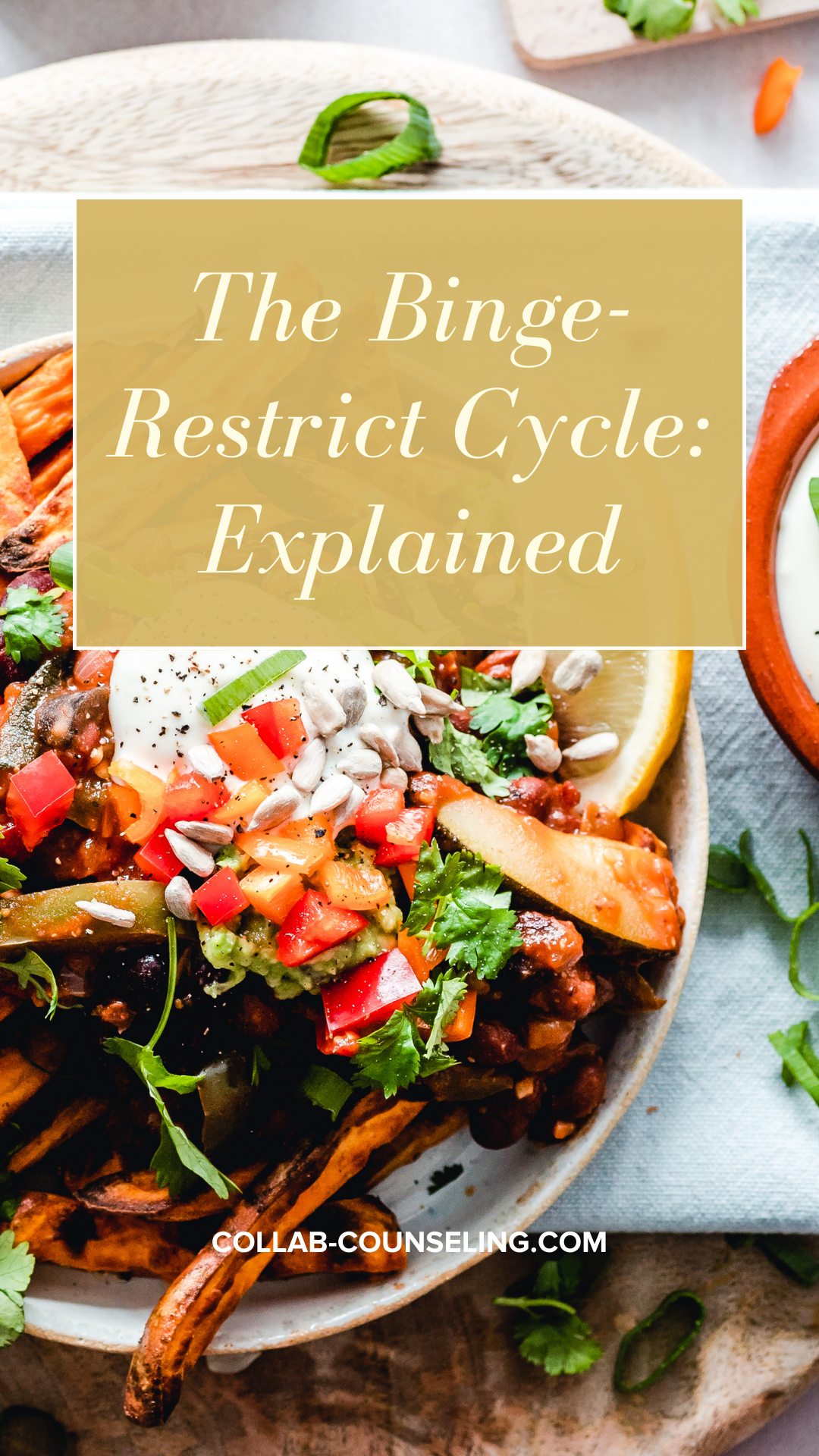Understand the Restrict/Binge Cycle
Today, we are excited to have one of our therapists, Brenna McClintock, teach you more about the restrict-binge cycle. Take it away, Brenna!
To struggle with your eating behavior can be so difficult, isolating, scary, and confusing! Not to mention all of the messages that exist within our society that tell us how we “should” be eating, what we should avoid, how often we should be eating, etc. It is absolutely exhausting. To get a better understanding and/or consideration for what is keeping you in a cycle (if you find yourself in one), let’s focus on the restrict/binge cycle.
Understanding the Restrict/Binge Cycle
When looking at the restrict/binge cycle, a major key to understanding this pattern is recognizing that restriction is the BIGGEST predictor for a binge. Let that sink in- in simplest terms, restriction leads to binging!! Hence, the cycle.
When you start to recognize just how closely tied restricting and binging behavior are, you leave less space for shame, which ties you to the cycle. The more you learn about yourself, your body, and your own eating patterns, you will find emotions play a role. As important as this is, emotions are just one of the many roles that play into eating behavior. Since eating behavior is so complex, you may find yourself stuck in a cycle without clarity on how to break out of it. You may not even know where to start. To help you practice dismissal of shame around the restricting/binging cycle, I want you to remember five things:
It is NOT your fault.
Nothing is wrong with you.
It can be biological.
Your relationship with food CAN look different.
You are capable of shifting patterns.
Blame and shame counteract and delay the healing process, so try to implement these reminders when you notice yourself existing within blame or shame while working on your eating behavior.
The Biology Behind the Cycle
While attending to blame or shame during the process of breaking a cycle, let’s consider what contributes to behavior at a biological level. Why does restriction actually set you up for a binge? It boils down to the brain. From a biological standpoint, if you restrict or limit certain foods, your brain actually places a higher reward on those foods (i.e. seeks them out!- hello preoccupation with food!). What can happen then is that when you do allow yourself those foods, you have wired your brain to over-consume, due to not only the reward/pleasure that it gives your brain but also due to a scarcity mindset that you have created. Your brain doesn’t have the ability to recognize your food rules or rituals. All it knows is that this “x” food hasn’t been provided to the body in a certain amount of time. Since the brain is unsure of the next time it will be able to consume this food, it's directed to “stock up” from a survival standpoint. Mindblowing, right?
Your brain is not against you, and you are not the problem.
Hopefully, you are able to consider how your brain is simply responding to your behavior and is motivated to survive! It has nothing to do with “willpower” and actually everything to do with “survival”. This wonderful explanation supports the idea that variety promotes homeostasis or balance more than “controlled eating”, whatever that means to you. If you allow yourself to listen to your body and your cravings as opposed to restricting them and potentially later on binging, that might be a part of your answer to stepping out of binging.
Breaking the Cycle
Regardless of what urge prompts the binging (unmet emotional needs/coping attempts, routine, etc), we now know that restricting sets you up for a binge later on, AND restricting as a response to a binge only contributes to the cycle. So in a moment that you are struggling with the urge to restrict and/or binge what do you do instead?
Consider what is motivating you! Explore this urge- where might it be coming from? A common contributor to urges is shame. As stated above, it is not uncommon to experience shame around binging. Shame is a difficult emotion to sit in, so oftentimes, a subconscious or conscious effort to “get out of that” is by restricting (this is also a good spot to check in with what thoughts you are having about yourself/what stories you are telling yourself about you in the aftermath of a binging episode). If you can recognize restriction is not a helpful response (as explained previously), you may be encouraged to implement alternate coping mechanisms that may be more effective AND work to put an end to the cycle.
Final Thoughts
If you or someone you know is struggling with striction and/or binging and needs help, our team of therapists and dietitians would love to provide support. Reach out today via our contact page.



